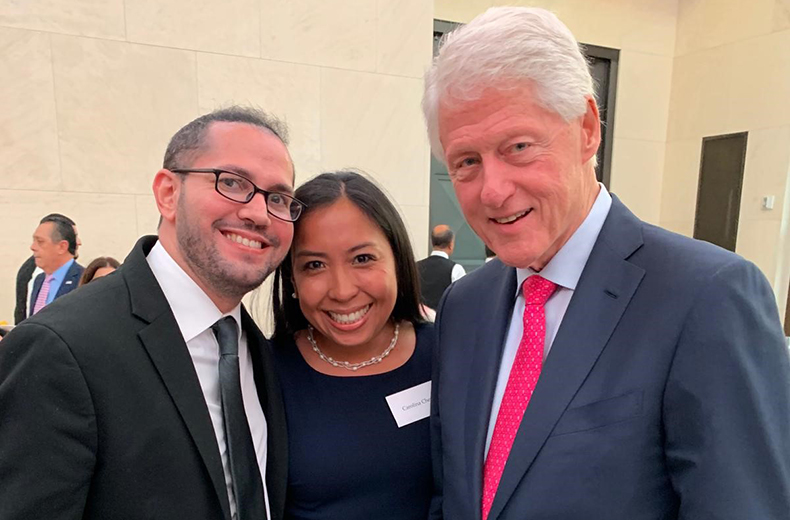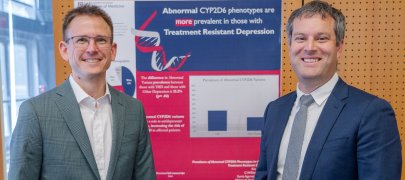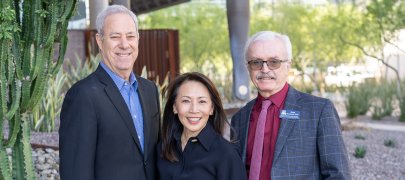
Faculty Profile: Riccardo Correa, MD

At six years old, Ricardo Correa, MD, already knew what he wanted to do with his life: He wanted to help others through medicine.
“When I was young, I knew I wanted to care for people during their most vulnerable times,” said Dr. Correa, who is the Endocrinology, Diabetes and Metabolism Fellowship director for the University of Arizona College of Medicine – Phoenix. “I saw the medical field as the perfect area where I could treat and help my patients.”
Never straying from his dream, Dr. Correa is a physician, researcher and educator who is helping advance the field of endocrinology.
“The most rewarding part of my job is when a patient says ‘Thank you,’ ” Dr. Correa said. “As a physician, we come into this job to heal people and when one of your patients tells you thank you for listening or changing their life, it is the most amazing feeling.”
Born in Panama, Dr. Correa came to the United States after medical school and post-graduation training. He spent two years in Panama studying clinical immunology and tropic diseases before moving to the United States to pursue a fellowship in endocrinology at the National Institutes of Health.
“Panama does not have many endocrinologists,” Dr. Correa said. “Back when I was in medical school, the focus was on tropical and transmittable diseases like the hantavirus. I went back a few weeks ago to give a lecture, and there has begun to be a shift; but in a country of 4 million, there are only about 14 endocrinologists.”
Prior to working at the College of Medicine – Phoenix, Dr. Correa was an assistant professor at Brown University. During his time in Rhode Island, he noticed a huge gap in the health care system and management of diabetes among minorities, specifically uninsured Hispanic individuals. This led to him starting A Healthy Life, a program for uninsured, undocumented individuals who suffer from metabolic syndrome.
“The patients in my clinic who had insurance didn’t have any problems getting most of their medications,” Dr. Correa said. “Then I started volunteering in this free clinic, and I saw the gaps in the health care system. They didn’t have access to the medications, so the only way that I could control their metabolic syndrome was by teaching about healthy lifestyles.”
Dr. Correa started classes to improve their health literacy. It was an eight-week program where community health care employees worked with patients, providing lectures on healthy lifestyles, cooking classes, Zumba and meditation.
As a result, they saw literacy about healthy habits increase and glucose levels, cholesterol and blood pressure decrease.
“Health literacy is not just speaking the same language, but understanding the culture, as this may indicate if an individual’s habits are healthy,” Dr. Correa said.
When Dr. Correa arrived in Phoenix, he thought there would be fewer disparities because 40 percent of the population is Hispanic, but he found the gaps still prevalent. He works with the Phoenix Alliance Community Health to create the same educational programs he started in Rhode Island for uninsured Phoenix residents.
To establish the program in Phoenix and other parts of the U.S., Dr. Correa applied and was accepted into the U.S. Presidential Leadership Scholars program which ended in June 2019. Sixty scholars learned about leadership through the lens of the presidential experiences of George W. Bush, Bill Clinton, George H.W. Bush and Lyndon B. Johnson.
“It was an absolutely amazing experience,” Dr. Correa said. “It was a great opportunity to meet and see the leadership skills of our presidents. I enjoyed getting to know and collaborate with my cohort. These people are really changing the world, and I learned from every one of them.”
While creating resources in Phoenix for uninsured residents, seeing patients at the Phoenix VA Health Care System and directing the college’s Endocrinology Fellowship, Dr. Correa still finds time to teach medical students and residents. He volunteers as a simulation instructor, doctoring instructor, is a committee member for Diversity and Inclusion and participates in the Capstone Program.
“I love training future endocrinologists and seeing how they grow from not understanding anything in endocrine to becoming my colleagues,” Dr. Correa said. “It’s more rewarding than seeing my own growth. At the end, a mentor always wants their mentees to becoming better than them. That is my goal.”
Topics
About the College
Founded in 2007, the University of Arizona College of Medicine – Phoenix inspires and trains exemplary physicians, scientists and leaders to optimize health and health care in Arizona and beyond. By cultivating collaborative research locally and globally, the college accelerates discovery in a number of critical areas — including cancer, stroke, traumatic brain injury and cardiovascular disease. Championed as a student-centric campus, the college has graduated more than 800 physicians, all of whom received exceptional training from nine clinical partners and more than 2,700 diverse faculty members. As the anchor to the Phoenix Bioscience Core, which is projected to have an economic impact of $3.1 billion by 2025, the college prides itself on engaging with the community, fostering education, inclusion, access and advocacy.


